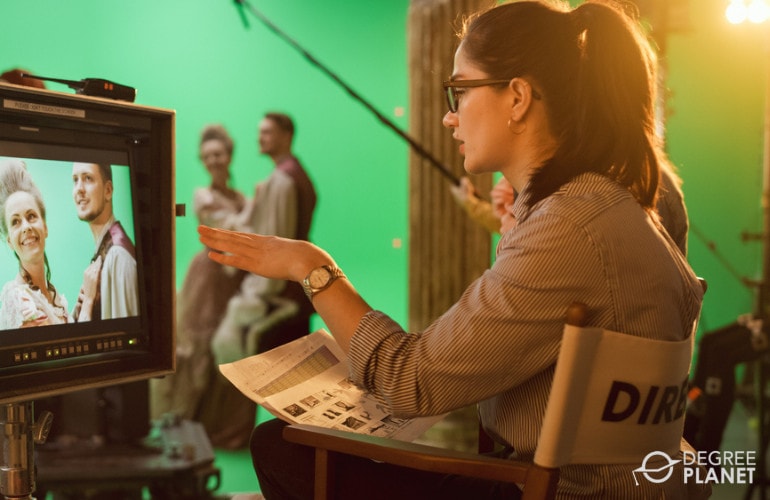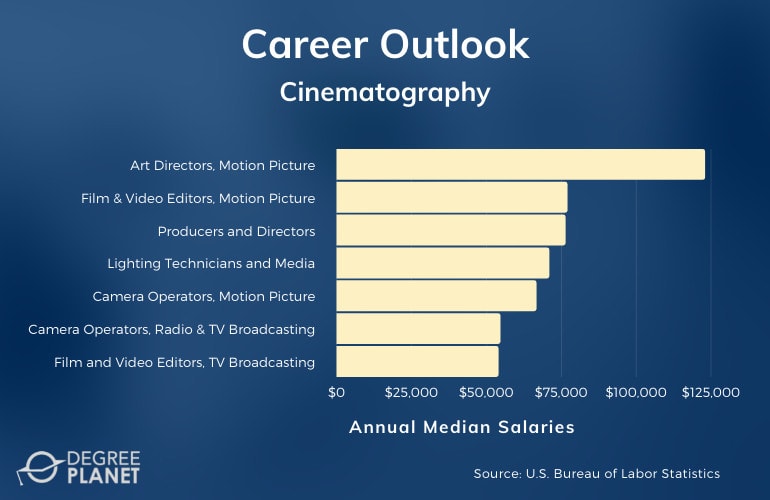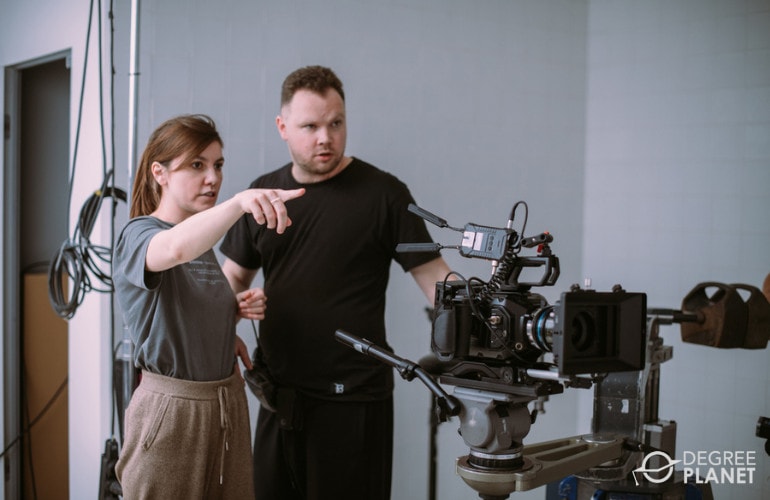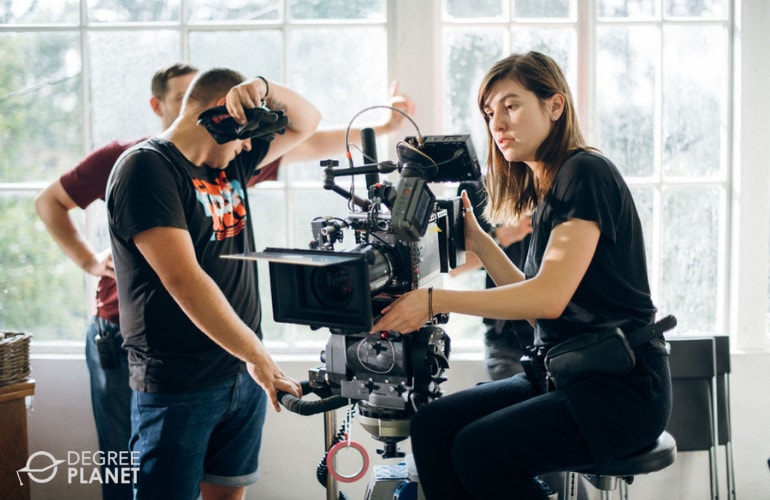If you have a passion for the silver screen, for making videos, or for telling stories, then you might be considering earning an online cinematographers degree. With a film degree, you might have the opportunity to help directors bring their stories to life.

According to the legendary cinematographer Gordon Willis, “A cinematographer is a visual psychiatrist, moving an audience…making them think the way you want them to think, painting pictures in the dark.”
Editorial Listing ShortCode:
Cinematography is a combination of art and science, rolled into one exciting career in storytelling.
Online Cinematographers Degrees

A cinematographer is sometimes known as the director of photography, and they oversee the camera crew and the lighting crew on a film set.
They are also responsible for the shots filmed. A cinematographer’s job is to bring the director’s dream to life by using cameras and lighting to tell the story. They can create the overall tone or mood of the film by controlling each shot’s:
- Lighting
- Composition
- Depth of field
- Zoom
- Focus
- Color
- Exposure
- Filtration
- Camera angle
Every shot they film should support the overall vision of the director. The director makes the important decisions regarding the creative vision, but the cinematographer makes it happen. If you enroll in an online cinematography program, your classes will likely be a mixture of practical training and film theory.
Editorial Listing ShortCode:
You may even create your own movie, video, or short film. Building a portfolio is key since employers tend to place a heavy emphasis on experience. Your classes may cover topics like lighting types and techniques, production preparation, line production, postproduction, film crew, shooting and editing effects, and animation.
Studying cinematography can also help prepare you for a number of roles in the field of filmmaking. Related careers include camera operator, video editor, videographer, and lighting technician.
Cinematography Careers & Salaries

Cinematographers can work in a variety of industries, and they are not limited to working on movie sets. Cinematographers can also be found in radio and television, in the government, or even in professional, scientific and technical services. Many are also self-employed.
The Bureau of Labor Statistics lumps cinematographers into the category of film and video editors and camera operators. Training in this area can also lead to other work opportunities in the filmmaking field.
| Careers | Annual Median Salaries |
| Art Directors, Motion Picture and Video Industries | $122,960 |
| Film and Video Editors, Motion Picture and Video Industries | $77,040 |
| Producers and Directors | $76,400 |
| Lighting Technicians and Media and Communication Equipment Workers | $70,980 |
| Camera Operators, Motion Picture and Video Industries | $66,700 |
| Camera Operators, Radio and Television Broadcasting | $54,660 |
| Film and Video Editors, Television Broadcasting | $54,030 |
| Camera Operators, Government | $52,550 |
| Audio and Video Technicians | $47,920 |
| Camera Operators, Professional, Scientific, and Technical Services | $43,930 |
Cinematographers may work full-time or part-time, and they often put in long hours to meet deadlines. They can work in offices and on location. If a cinematographer is self-employed, they may even have periods of unemployment in-between assignments.
Cinematography Curriculum & Courses

While every bachelor program in cinematography is different, you may take classes similar to the following:
- Art Design and Location Shooting: You’ll study set choices and production venues based on the logistical needs of the camera.
- Cinematography and Lighting: You’ll learn how to manipulate the mood with proper lighting techniques and tools.
- Color Correction and Grading: In this course, you can learn electronic image enhancement, from simple manipulation to sophisticated artistic techniques.
- Composition and Visual Design: You’ll learn how to design, frame, compose, and arrange images to tell visual stories.
- Directing: In this course, you’ll study techniques for directing, acting, casting, and composition.
- Electronic Field Production: You’ll learn how to research and interview, and you’ll learn about other technical requirements that are unique to field productions, like documentaries.
- Film Criticism: You can gain appreciation for how filmmakers create meaningful experiences for their audiences while learning how to critique their work and manage critiques from your own clients.
- Independent Film: You can learn how to create and distribute feature films to a wider audience with a lower budget.
- Introduction to Digital Cinematography: This course explores the art of visual storytelling and how to effectively use the camera, lighting, and other tools to deliver your message.
- The Language of Filmmaking: You’ll learn the many components of film language used by directors to tell their stories.
Online degrees in cinematography usually require a final film project at the end of the program, which can help to showcase your skills and talents when job hunting.
How to Choose an Online Cinematography Degree Program

Finding an online cinematography program may seem daunting with so many programs and courses to choose from. How do you know which one is right for you? You can start by listing out what you need from a program. Your lifestyle, budget, career goals, and responsibilities can play into what kind of program you need.
Here are some additional factors to consider:
- Program composition. Some programs require on-campus attendance. If you need a strictly online program, you may want to pay attention to program composition when searching for a program.
- Program topics. A well-rounded program looks at the classic films and what makes them great, and it explores the components of good storytelling, style, color, camera angles, and design.
- Program technology. You can look for training that covers cameras, lighting, equipment, digital and computer breakthroughs, and hands-on camera work.
- Concentrations. There are many concentrations offered within cinematography, so it can help to look for a program that offers exactly what you’re interested in.
- Accreditation. A regionally accredited school has been shown to meet a high standard of academic excellence.
- Reputation. You may want to research a program’s reputation for creating great cinematographers.
- Experience. Some programs offer hands-on experience through internships, externships, and job simulations.
- Faculty. You may want to consider whether a program is comprised of teachers who are still active within the film industry.
High-quality programs can help you to stand out in an involving industry. Creating a spreadsheet of the qualities you are looking for in a program might make it easier to compare the specifics of various programs.
Admissions Requirements

Before applying to your program, you can look at the admissions page on the school’s website or contact the admissions office. Not all programs require the same admissions package, so it’s helpful to make sure you send in all the materials your school requests.
Some common admissions requirements include:
- SAT or ACT scores (only some schools require them)
- Letters of recommendation
- Narrative statement
- Official transcripts
Some programs may also require an example of your original created work.
Accreditation

Not all programs are created equal. When searching for online or on-campus programs, it’s beneficial to pay specific attention to accreditation.
Regional accreditation ensures that your school meets high academic standards. A school that holds regional accreditation is recognized as offering a high-quality education. For this reason, many employers prefer candidates who hold degrees from accredited institutions.
Editorial Listing ShortCode:
Plus, some forms of financial aid are only offered to students attending accredited schools, and college credits typically only transfer between accredited universities. To see if your school is accredited, you can visit the Council for Higher Education Accreditation (CHEA).
Financial Aid and Scholarships

Federal and state financial aid is awarded to many undergrad students based on need. You can see if you qualify for grants, loans, or even work-study programs.
To see if you qualify for need-based aid from the federal government, you can fill out the Free Application for Federal Student Aid (FAFSA). In many cases, your state government will use your FAFSA results to determine your eligibility for state aid as well.
Any available scholarships can also help reduce your overall tuition costs. These are often awarded by public or private organizations. You may want to check with businesses, organizations, nonprofits, and clubs.
You can also ask your program department at the university you’ll be attending if they provide scholarships to enrolling cinematographers and filmmakers. Some employers also offer their workers tuition assistance or training programs.
What Does a Cinematographer Do?

In order to help create the director’s vision, a cinematographer is usually involved in the pre-production and principal photography stages of a film.
In the pre-production process, the cinematographer may become acquainted with story boards and shot lists. They can also attend rehearsals with the actors to get a feel for their actions and movements in a scene.
During filming, the cinematographer is responsible for every shot. They determine the lighting, angle, and techniques used for every scene. They also oversee the camera and lighting crew during filming.
How Much Does a Cinematographer Make?

The Bureau of Labor Statistics includes the position of cinematographer within the category of film and video editors and camera operators.
The median annual salary for camera operators in the motion picture and video industries is $66,700, and the median for film and video editors in those same industries is $77,040.
According to the Bureau of Labor Statistics, some cinematographers also act as artistic directors on a film set. The median salary for art directors in the motion picture and video industries is $122,960.
Do Cinematographers Need a Degree?

It usually takes a mix of education and experience to qualify for a position in cinematography. While a bachelor’s degree is typical, it may be possible to get a job with an associate degree or a certification.
According to the Bureau of Labor statistics, overall employment for film and video editors and camera operators is projected to grow 29% over the next ten years, which is much faster than the average. Likewise, art directors are expected to experience 11% job growth.
Editorial Listing ShortCode:
The number of streaming services continues to increase, with a need for movies and shows to add to their content. New degree programs and courses are developing to support this growing demand.
What Can You Do with a Cinematography Degree?

A cinematographer’s main role is to supervise the camera and lighting crew on a film set and to support the director’s overall vision with each shot filmed. They bring the story to life.
A cinematography degree can help develop skills that are applicable to a variety of positions. Careers related to film include cinematographer, camera operator, video editor, and director. Depending on the position, you may have to first acquire experience in the industry.
With your camera and lighting skills, you aren’t limited to the TV and movie industries. Some professionals work in radio, for the government, or even for private service organizations.
Can You Study Cinematography Online?

Yes, there are a number of online programs that allow you to study cinematography online. While there are not many degrees specifically in cinematography, it is often offered as a specialization within a film or motion pictures and television degree.
Though there are some schools that offer an entirely online film degree, there are still many that only offer hybrid options. If you enroll in a hybrid program, your coursework would include a combination of online and in-person classes.
How Long Does It Take to Get a Bachelor’s Degree in Cinematography Online?
An associate program can introduce you to practical skills, such as sound and lighting design, but a bachelors can offer more advanced training, qualifying you for positions with more responsibility.

If you follow a traditional 16 week semester and attend full-time, it generally takes 4 years to complete a bachelors degree program. There are a number of schools and online programs that offer shorter terms, though. If you follow an 8 week term and stay continuously enrolled year-round, you may be able to finish in less time.
What’s the Difference Between a Bachelors in Cinematography vs. Videography Degree?
Most cinematographer or videographer positions require a bachelors degree. Degrees related to communications, film studies, or broadcasting can help you qualify for these positions.
Some degree programs offer the opportunity to specialize in either cinematography or videography, so here are some differences to help you decide which is right for you.
| Cinematography Degree | Videography Degree |
|
|
A videographer is usually self-employed and captures events, such as weddings. A cinematographer often oversees a camera and lighting crew on a film set.
What’s the Difference Between Digital vs. Film Cinematography?
Some cinematographers prefer digital cinematography, and some prefer film. Below are a few differences between the two.
| Digital Cinematography | Film Cinematography |
|
|
It might be beneficial to familiarize yourself with both mediums. Being skilled in both digital and film cinematography may provide you with more job opportunities.
Is a Cinematography Degree Worth It?

Yes, a cinematography degree is worth it for many students. If you love storytelling and filmmaking, you might be interested in a career in cinematography. With the explosion of technology and streaming services, cinematographers and other positions within film production are in high demand.
The Bureau of Labor Statistics projects 24% job growth for camera operators for television, video, and film over the next ten years. Film and video editors are expected to experience 33% growth, which is much faster than the average for all occupations.
Editorial Listing ShortCode:
Some cinematographers can also act as artistic directors. Employment for art directors is expected to grow 11% over the next ten years.
Universities Offering Online Bachelors in Cinematography Degree Programs
Methodology: The following school list is in alphabetical order. To be included, a college or university must be regionally accredited and offer degree programs online or in a hybrid format.

The Academy of Art University offers an online Motion Pictures and Television degree program.
It is designed to allow students to earn the degree at their own pace, in their own time. Students have access to collaborative spaces in the Learning Management System and opportunities to create videos and receive feedback from peers and instructors.
Academy of Art University is accredited by the Western Association of Schools and Colleges.

Arizona State University offers an online Bachelor of Arts in Film and Media Studies. The program requires a total of 39 classes that are 7.5 weeks long, for a total of 120 credit hours. The curriculum focuses on the critical analysis of film, television, gaming, and new media.
Arizona State University is accredited by the Higher Learning Commission of the North Central Association of Colleges and Schools.

Columbia College offers a BFA in Visual Effects. The program covers how to create 3D models, animations, simulated effects, and composites.
Students can choose an emphasis in Animation, Compositing, or Digital Modeling. The program uses industry-standard software and professional equipment. Faculty members have experience working in the film and game industries.
Columbia College is accredited by the Higher Learning Commission.

Grand Canyon University offers a Bachelor of Arts in Digital Film with an emphasis in Production. The program is designed to provide an in-depth look at modern cinematography and narrative storytelling. You can take classes either on campus or online. Campus classes are 15 weeks long, and online classes are 7 weeks long.
Grand Canyon University is accredited by the Higher Learning Commission.

Lindenwood University offers a BA in Communications with an emphasis in Media Arts and Production.
Coursework includes Digital Photography, Imaging and Illustration, Advanced Audio Production, Desktop Publishing, Mass Communications Theory and Ethics, and Visual Storytelling. Students also have the opportunity to participate in an internship.
Lindenwood University is accredited by the Higher Learning Commission.

Maharishi International University offers a BA in Cinematic Arts and New Media program online, on campus, or in a hybrid format. Students are expected to participate in project-based classes and create professional portfolios. Internships are also available. The curriculum also includes transcendental meditation as a technique to increase creativity.
MIU is accredited by the Higher Learning Commission.

Miami International University of Art & Design offers a Bachelor of Fine Arts in Digital Filmmaking and Video Production.
Admissions are on a rolling basis, so you can apply at any time. Courses include studies in acting, directing, compositing, editing, broadcast graphics, lighting, sound design, and scriptwriting. Students are expected to complete a senior thesis project to showcase their skills.
Miami International University of Art & Design is accredited by the Southern Association of Colleges and Schools Commission on Colleges.

The University of Massachusetts—Amherst offers a BA in Interdisciplinary Studies with a focus in Film and Media Studies. The degree can be completed entirely online, and you can receive credit for your professional portfolio or work experience. Course topics include screenwriting, visual storytelling, film criticism, news writing, and reporting.
The University of Massachusetts Amherst is accredited by the New England Commission of Higher Education.

The University of Montana offers a Bachelor of Arts in Media Arts. The program is fully online and is intended to help students maximize their creative potential. Coursework includes opportunities to learn about interactive media, web and Internet technologies, gaming, and a variety of digital design applications.
The University of Montana is accredited by the Northwest Commission on Colleges and Universities.

Wilmington University offers a Bachelor of Science in Video and Motion Graphics with a concentration in Digital Filmmaking.
Most core courses can be taken online, as can some video and motion graphics courses. Coursework includes Digital Image Manipulation, Camera and Cinematography Techniques, Studio Production Techniques, a senior project, and an internship.
Wilmington University is accredited by the Middle States Commission on Higher Education.
Getting Your Degree in Cinematography Online

If you are drawn to the lights, camera, and action, then you might consider a career in cinematography.
Cinematographers can bring the actions and emotions of a story to life. It is their job to translate the director’s vision to the audience. Working in the field of cinematography can enable you to work with art, technology, and design. New streaming technologies have increased the demand for cinematographers and other film production workers.
If you want to find your place behind the limelight, you can start by exploring online cinematography programs from accredited schools.

